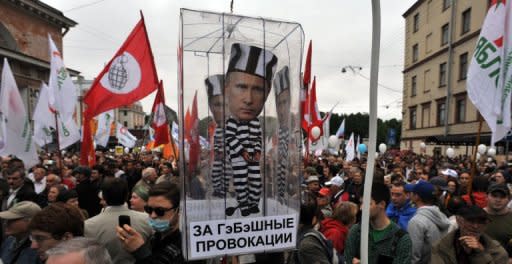Putin bids to squeeze opposition with tough laws
In just over two months since Vladimir Putin returned to the Kremlin, Russia's parliament has rushed through a flurry of legislation giving him new powers to crack down on the opposition movement. "This is Vladimir Putin's post-electoral package of repressive bills aimed at harshly clamping down on internal politics in the country," said human rights lawyer and blogger Pavel Chikov. The amendments "will undoubtedly be used actively against the awakening civil society in Russia," he told AFP. In the last month, the parliament has passed laws massively raising fines for misdemeanours at protests and allowing the government to block access to blacklisted Internet sites. On its last pre-holiday session on Friday, the lower house voted through a bill recriminalising slander and libel with massive fines, and another ordering NGOs with international funding to call themselves "foreign agents." The bills now need to be passed by the Federation Council upper house and then signed into law by President Putin. The day was swiftly named Black Friday by opponents. The authorities insist that the measures reflect international norms and that civil society even stands to benefit. "These are laws that are in the interests of civil society. They are not against anyone. They are for protecting the safety of civil society," said the head of the lower house's security and anti-corruption committee, Irina Yarovaya. Yet critics say the laws are clearly aimed at dampening opposition to Putin. "Now it is possible to create a criminal case against any active person. Not necessarily put them in jail, but stub out their desire to take part in protests," said political analyst and editor of Russky Zhurnal website, Alexander Morozov. A key question is how the powers will be used against protest leaders, particularly charismatic lawyer, blogger and anti-corruption campaigner Alexei Navalny. Rallying slogans coined by Navalny, "Putin is a thief" and "Party of Swindlers and Thieves " to describe the ruling party, would fall under the new slander law, hinted the lower house's deputy speaker, Sergei Zheleznyak. "When people try to use slander to prove crimes by the authorities, accusing whole large groups of people, then they are criminals! This is unacceptable," he said in televised comments. "We know perfectly well whom this law is against: against someone ... who calls a United Russia deputy a swindler and thief," said opposition-backing deputy Ilya Ponomarev of A Just Russia party in parliament on Friday. Navalny has had his apartment searched as part of a criminal probe into violence at a May 6 protest that has seen 14 arrested and looks likely to be a setpiece to haul in the opposition. The protest leader has admitted he would struggle to defend himself against a slander charge. "Formally, legally, I have no proof that someone is a swindler. There hasn't been any court verdict. But there never will be any court verdict if the person is a minister and he is protected by our state," Navalny told NTV. "They will continue intimidating Navalny until he ceases any public activity, on the street or on the Internet," predicted Morozov. Yet analysts differed on how effective the bills would be at curbing the wave of public protest. Morozov said he believed that the mass opposition movement would be frozen with only radicals such as Sergei Udaltsov of the Left Front movement carrying on protests. "Society will once more divide up into those who are ready to carry on an uncompromising battle, like Udaltsov, and those who prefer to stay silent," he said. "We can expect cold days ahead, lengthy frosts," he said, invoking Cold War rhetoric. For Putin, the strategy carries no risk, since he can rally support from a group of "aggressive conformists" who work for the state or rely on government contracts and grew richer during the Putin years, Morozov argued. But Yury Korgunyuk of the Indem think tank disagreed, saying he thought Putin's strategy would not be effective long-term. "Putin is thinking about today, not tomorrow. Now they will try charging someone under the new laws, but the protest will only keep on swelling," he told AFP. "Putin is doing all he can to bring on the frosts, but the ground is too heated, it will not freeze."




